- Home
- Andrew Wareham
Deadly Shores (The Duty and Destiny Series, Book 11) Page 4
Deadly Shores (The Duty and Destiny Series, Book 11) Read online
Page 4
“Well said, sir. I have a lieutenant who may be made in his place, to great benefit, and a midshipman who may rise in the world. I shall beg you to write the young gentleman’s commission, sir – an Admiral’s signature carries more weight than that of a Commodore.”
Mr Shifnall was in some ways a naïve gentleman; he accepted his promotion with delight and was anxious to board the very next vessel for England, going so far as to accept a shared cabin on the leaving despatch cutter – a most uncomfortable berth. He saluted Sir Frederick as the cutter left harbour, raising his hat high in his delight to have been made.
“Poor little fellow, Sir Iain. A fortnight to the Admiralty and then disillusion will set in – but I shall not be there to see it. Who is to take his place? I thought young Kent would do very well.”
Sir Iain agreed; the boy had become a most reliable officer and should be given the opportunity to spread his wings.
“Make whom in his place, sir?”
“Mr Warren to nominate his senior boy, if he is happy with him.”
Warren thought the lad would do very well, would be grateful for his commission.
“I have a pair of captain’s servants, sir, and will give both their warrants. I can use seven mids rather than six, sir.”
Frederick had a strong suspicion that the boys’ places would have been purchased by hopeful parents with deep pockets – but that was none of his affair. Captain Warren had made a most efficient ship of Norge and his desire to turn a penny must not be held against him.
They stayed a week in Gibraltar, giving leave to the hands, there being little opportunity to desert from the Rock, and then sailed into the Mediterranean, a tiny schooner added to the squadron and flying ahead under Mr Dalby’s command.
Admiral Ball had sent one of his own vessels to Lord Collingwood, telling him of all that Frederick had achieved and intended to do now. The delays involved meant that Frederick must have at least six weeks before the Commander-in-Chief announced his pleasure, or otherwise.
Book Eleven: The Duty
and Destiny Series
Chapter Two
“North, Sir Iain, in a scouting line, Waldeman closest to the coast at about two miles distant, depending on shoals. From us frigate, Stour, Norge, Glommen and frigate. Nellie to work as close to the shoreline as she may, forging ahead a mile or two, and the schooner, whose name I have forgotten yet again, may examine inlets and cast about well ahead of the squadron.”
“Pipsqueak, sir. It would seem that a horse of that name won a great race just last year and Admiral Ball drew it in the sweepstake and made one hundred pounds.”
Frederick looked blank.
Sir Iain explained the principles of a sweepstake – similar in many ways to a lottery.
“Ah! Gambling! On horses. I am afraid I left that uniformly unprofitable enterprise to my poor brother.”
“It is a very popular habit among naval men ashore, sir.”
“Perhaps that is why they so often discover their half-pay to be inadequate, Sir Iain.”
Sir Iain agreed that it might be so; that was a topic he would not argue.
“What are the orders for the scouting line, sir? May they pursue?”
“Identify, inform me, and take all necessary steps to prevent the escape of any unknown or hostile vessel. Which raises the question of which frigate should be further to sea. Mr Dench, I think – his Iris deserves the opportunity to distinguish herself. That will place Mr Vereker in position to act inshore if the occasion arises, seizing a vessel which has run, perhaps. I had rather not see Mr Dench skipping about on land without one of us to hold his hand.”
“What do we expect, sir?”
“Warn the captains that it is probable that the French will wish to land forces in Spain, reinforcing those fortresses they already hold along the coast. The blockade of Toulon will be tight – we may rely on Admiral Collingwood for that – so it is very likely that the French will slip small ships out of the lesser ports along their coast, possibly forming up into convoys, just as likely to be running independently. We might well be inclined to assault any one of those fortresses that seemed weakly held, and which had Spanish forces nearby.”
It was a risk, but greater chances had been taken in the past, and not all had resulted in failure.
They avoided the Spanish naval bases – they might well be friendly, but news could take months to cross a land as poorly served by roads as Spain. It was wiser to assume that the forces in Cartagena, the largest, could be inclined to be amicable, but might nonetheless still consider themselves bound by orders to attack the British.
The winds were not unfavourable and the Mediterranean tended to be a less hostile sea than the Atlantic; against that, a strong easterly would leave them facing a pitiless leeward shore, always a worry in Spanish waters. The patrol line must be aware of the possibility that they would have to make for deeper waters, and there must be a rendezvous against that eventuality.
Frederick considered the Balearics, but decided that his orders must be read as confining him to mainland Spain. It was tempting to go prize hunting, but perhaps would be seen as ill-mannered of him, and he must not tread on Lord Collingwood’s toes – he might well send his own cruisers to those waters.
“Sir Iain, you might wish to remind the squadron that we are not to be capturing Spanish merchantmen. Not a desirable habit under present conditions. Off Barcelona by ten miles, our rendezvous; nothing in three days, return to Gibraltar.”
“Bad location, sir, with many of Spanish merchantmen who might be very tempting, sir.”
“Deliver us from temptation, Sir Iain! We are not to jeopardise the alliance we may have ourselves created. That was not perhaps expressed as well as I might have liked, but you know what I mean!”
Sir Iain did and left for his quarterdeck, there to turn Frederick’s orders into clear, short, unequivocal signals. He trusted all of the captains in the squadron, but knew as well that they would seize on the least ambivalence that might be construed as giving them the freedom to chase off as they fancied. He had done it himself on occasion, thought he was up to most of the old tricks, but had little doubt they would try to invent new.
Frederick remained in his cabin, Mr Aggers at his side, working his way through the vast mass of dockets that had resulted from a stay in harbour. Every item of stores taken aboard each of the ships of the squadron had been accounted for by Master, Purser, Boatswain, Sailmaker, Carpenter, Gunner or Surgeon. Each had sent his books to his own captain and in turn the various official reports had gone to the Commodore, who had the unenviable task of creating a unified set of returns to be sent to the Admiralty and the eyes of the cynical, weary, time-worn clerks who were responsible for the spending of Government money on stores and victuals and who begrudged every last penny. The clerks in London were generally have believed to have destroyed more naval officers than the French and Spanish put together; it was certain that they had a greater hatred for British sailors than could be found in Paris or Madrid.
Frederick surveyed the mass of figures which had finally been set into the proper places in the printed forms and the set of certificates that accompanied them, attesting to their certain exactitude. He signed his name a dozen times over, knowing that each was an act of perjury.
“Norge did not lose three ankers of rum overboard in the Channel storms, Mr Aggers! It is an impossibility, as all must know, but here I have the dockets signed and counter-signed and saying it certainly to be so! I must lend my name to this horrible falsehood, for lack of any alternative, and I know that I shall be disbelieved in London. Six months from now I shall receive a letter from the Clerk to the Compter, or some such mediaeval hangover, demanding inquiry into the matter – by which time we shall all have forgotten the business and will be hard-pressed to recall or discover the exact lies we told – which will lead to further letters and commissions of inquiry. It will drag on for the next decade, and at the end will be disposed of as ‘unproven’ –
ten times the value of the rum expended by nit-picking, pettifogging pen-pushers, all to serve no purpose other than to give aid and comfort to Bonaparte! Please to write a note to Captain Warren begging him to take more care of his rum in future, retaining a copy to accompany these reports. It may go some way to placating the bloodthirsty monsters in London!”
Lieutenant Aggers gravely made a note to himself to produce the required letter; Captain Warren would be expecting it, probably quietly sniggering the while.
“I am much tempted, Lieutenant Aggers, to make an inspection of the new timbers inserted into Nellie’s decking, to replace rotten boards, her Carpenter says. One hundred and twenty feet of deals, so he says. I believe the twenty, but the hundred will have been sold off to keep him drunk for a fortnight!”
“Impossible of proof, sir. Not really worth the effort, sir.”
“I know. I merely hate to sit here, knowing that I am being mocked.”
Mr Aggers did not point out that Frederick had done exactly the same himself in earlier years – he felt it would not be tactful.
There was a noise on deck, response to a hail from the foremasthead. Frederick sat and waited to be called, leafing through the papers on the desk, pretending to be engrossed in his work; there was nothing to stop him going on deck uncalled, but he was sure his dignity would not be well-served by popping in and out like a jack-in-the-box every time there was a stir.
Midshipman Quarles knocked and entered, not delaying to be called in, which in itself indicated he was about to summons Frederick on deck.
“Mr Quarles! What can I do for you, sir?”
“Captain’s compliments, sir, but he would wish you to come on deck.”
“Very well, Mr Quarles. You should give me necessary information at this juncture – it is not impolite to the captain to tell me yourself.”
“Oh! Thank you, sir. I was not sure… There is a signal repeated down the line, sir, to say that a pair of sail, probably merchantmen or naval transports, have been seen to the east-north-east and that Iris is giving chase, they having tacked, sir.”
“Very good, Mr Quarles. Now, sir, what else should you have told me?”
“Oh… The wind, sir? It is in the south-west, sir, topgallants set, sir, but the Master says they are to be taken in, sir, if it strengthens at all. Visibility is good, sir, but there are rain patches to the south-west, which might come down the wind upon us.”
“Much better, Mr Quarles. Always tell me the wind and sail set. I know Sir Iain has not called ‘All hands’, for I must have heard the noise with that. I shall come on deck immediately.”
Quarles departed, thankful he was not to be beaten to remind him of his duty. Frederick chuckled and turned to Aggers.
“That boy has the makings, I think, Mr Aggers. Bright and very willing to learn. If he does not get killed first, he will make lieutenant. A pity in some ways, for the war must come to an end at some time in the next decade and the peacetime navy will have very few opportunities, and them mostly going to boys with influence in the background. He will, if he is wise, shift into the merchant service where he will at least make a comfortable living – better than years in a Portsmouth lodging-house on half-pay.”
Aggers, still thankful for his rescue from that fate, agreed. The navy had expanded vastly, must contract almost equally when peace came – if ever it did.
They walked out on deck, found nothing happening. Iris was out of signal range and they must wait until she was successful in her chase and returned with captures, or was unable to run them down, which she would not admit to before nightfall.
“Well, Sir Iain, if Iris cannot catch them, then it will be because they are faster than her, which predicates them to be ships of war. Frigates, probably, because Iris, being built for northern seas, is slower than the Mediterranean ships who need never fear ice.”
“Logical, sir, but it is just possible that they might be corsairs, some of which can be very speedy. They might be on the smuggling lay, sir, breaking the blockade perhaps. Or they could be slavers, which we know are busy off the African coast. If they cannot be caught then the probability is that they would not be French ships running troops into Spain, that is certainly true.”
“If they are full of French soldiers, Sir Iain, then Captain Dench must be careful in his dealings with them. Bonaparte’s soldiers have no concept of honour, will offer a surrender and then breach it quite casually. Possibly it might be wise to detach Norge to assist?”
They agreed it might be the better course and sent the signal, to Captain Warren’s pleasure; it was rare that a seventy-four had the opportunity to sail out of her commodore’s sight.
They watched in silence as Norge turned out of the line, taking a reef out of the courses and adding a careful selection of jibs.
“Almost directly before the wind, sir. Rarely a ship’s best point of sailing but Mr Warren is pushing Norge to at least eight knots already, and she is still picking up. I might not follow his course, though, sir. He is choosing to make an almost direct line towards Iris; I would be inclined to head more to the north and then make my easting so as to keep the wind on one quarter or the other. His ship, however, and he will know her by now.”
Frederick nodded, noncommittally; he knew Warren to be a competent ship-handler, believed Sir Iain to be at least his match. Both were easily his masters.
“Signal from Nellie, sir.”
The Master gave the call, stretching to kick at the rump of the signals midshipman, who was watching Norge.
“Nellie, sir. Inlet, sir, small harbour. Battery. Three of sail, sir. Polaccas, sir. French flag to battery.”
“Acknowledge, Mr Sykes, and wake-up, or you’ll get more than a kick up your backside! Perlen to examine battery and harbour.”
The flag hoists broke out and were responded to.
“All we need is a sighting just offshore and the squadron will be pulled three ways, Sir Iain!”
“We must worry about that when it arises, sir.”
Perlen reported first, requiring less than an hour to find the small harbour, examine it thoroughly and then clap on all sail as the battery opened fire.
“Perlen sending a boat, sir. Captain aboard.”
“Understandable – those were very big guns if we heard them at this distance.”
Forty more minutes and Captain Vereker had been piped aboard and made formally welcome and had a glass placed in his hand, all as was almost essential practice; it might have been possible to have left out the formal welcome.
“What did you see, Captain Vereker? We heard the guns from here.”
“A conundrum, sir. The harbour is old, ancient one might say. The stonework is mediaeval, and I saw Roman bricks in some of the walls. One cannot mistake their small size, sir. Yet there is very little present to suggest that it is still of importance. Olive groves on the hillsides, and orange trees, I believe, and probably vineyards – difficult to tell this early in the year. There is a small settlement, no more than a fishing village, one hundred houses at the outside. There is a warehouse by the quay that suggests a degree of trade, sir, but not vast. The three polaccas are small vessels – one hundred to one hundred and fifty tons, no more, sir. I could not tell whether they were loading or delivering, sir. The battery, sat perhaps two hundred feet up on a bluff, overlooking the inlet, a cable inland, has four of the largest guns I have ever heard. A deep, roaring boom, sir, and a water splash beyond anything I have ever seen. Why there should be such great guns in so unimportant a location, I know not, sir. Nor can I imagine why the French should be there. I looked for a road leading inland, thinking the harbour might serve an unexpectedly rich hinterland – but I saw no more than tracks, despite going to the masthead myself with a glass.”
“The hills are rugged, even if low, just a small distance inland,” Lieutenant Aggers commented. “Could there be mines?”
“This is when we need Captain Murray,” Frederick responded. “He would have answered that question
and a dozen others.”
“There is one way of finding out, sir,” Vereker suggested. “We are north of Cartagena by a hundred miles and more, and have seen no evidence that the Spanish are at sea. This is the most southerly French fort we have discovered. May we assume that the polaccas are conveying rations to the French?”
“More likely powder and ball. The Frogs generally live off the land, Mr Vereker. We may assume they will have seen Waldeman in the distance and that they may be forewarned of the possibility of us seizing their vessels. Did you see any tracks along the shore? Are there other inlets where boats could land to the north or south? Have we received any report from Pipsqueak?”
There was a track, suitable for an oxcart, Captain Vereker thought, which would almost certainly lead to an inlet on the far side of a small but rocky point. It was possible that fishing boats would use the lesser inlet when the wind was against them, sending their catches to the village by way of the track. The battery had no view of this anchorage.
“Tempting, is it not?”
“Very, sir.”
Frederick made his decision.
“Sir Iain, it is your turn. Take the Marines from Waldeman and Perlen and as many seamen as you think good, and land at the second inlet. Then take the battery and seize the polaccas. Examine the warehouse and any other stores you may discover. Destroy the great guns, of course. Keep watch for French troops – we do not know who or what may be discovered just a short distance inland. If at all possible, complete the business by dawn – certainly be in a position to withdraw by first light. Mr Aggers, put those orders into writing, if you please, and agree them with Sir Iain before they come to me for signature.”

 A Killing Too Far
A Killing Too Far Killing's Reward
Killing's Reward A New Place
A New Place The Killing Man
The Killing Man Bold and Blooded
Bold and Blooded The Breaking Storm (Innocent No More Series, Book 2)
The Breaking Storm (Innocent No More Series, Book 2) Nobody’s Child
Nobody’s Child 04 Peking Nightmares (The Earl’s Other Son Series, #4)
04 Peking Nightmares (The Earl’s Other Son Series, #4) Red Man
Red Man Foreign Mud
Foreign Mud The Gathering Clouds (Innocent No More Series, Book 1)
The Gathering Clouds (Innocent No More Series, Book 1) 06 A Soldier’s Farewell (Man of Conflict #6)
06 A Soldier’s Farewell (Man of Conflict #6) Chinese Whispers
Chinese Whispers 02 Shanghai Dreams (The Earl’s Other Son #2)
02 Shanghai Dreams (The Earl’s Other Son #2) Hungry Harry: An Orphan in the Ranks
Hungry Harry: An Orphan in the Ranks A Wretched Victory (Innocents At War Series, Book 6)
A Wretched Victory (Innocents At War Series, Book 6) Illusions Of Change (A Poor Man at the Gate Series Book 6)
Illusions Of Change (A Poor Man at the Gate Series Book 6) The Wages Of Virtue (A Poor Man at the Gate Series, Book 8)
The Wages Of Virtue (A Poor Man at the Gate Series, Book 8) Blood and Famine (Man of Conflict Series, Book 4)
Blood and Famine (Man of Conflict Series, Book 4) The Friendly Sea (The Duty and Destiny Series, Book 1)
The Friendly Sea (The Duty and Destiny Series, Book 1) Bursting Balloons (Innocents At War Series, Book 5)
Bursting Balloons (Innocents At War Series, Book 5)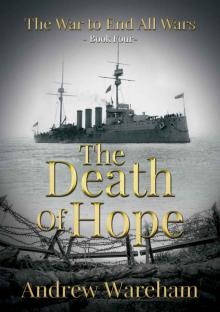 The Death of Hope
The Death of Hope Deadly Shores (The Duty and Destiny Series, Book 11)
Deadly Shores (The Duty and Destiny Series, Book 11) The Vice Of Virtue (A Poor Man At The Gate Series Book 10)
The Vice Of Virtue (A Poor Man At The Gate Series Book 10) Virtue’s Reward (A Poor Man at the Gate Series, Book 11)
Virtue’s Reward (A Poor Man at the Gate Series, Book 11)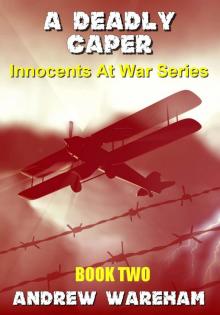 A Deadly Caper (Innocents At War Series, Book 2)
A Deadly Caper (Innocents At War Series, Book 2) The Pain Of Privilege (A Poor Man at the Gate Series Book 4)
The Pain Of Privilege (A Poor Man at the Gate Series Book 4) Far Foreign (The Duty and Destiny Series, Book 9)
Far Foreign (The Duty and Destiny Series, Book 9)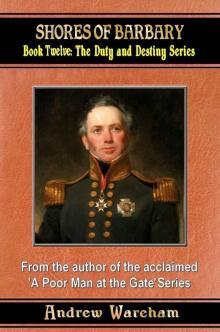 Shores of Barbary (The Duty and Destiny Series, Book 12)
Shores of Barbary (The Duty and Destiny Series, Book 12)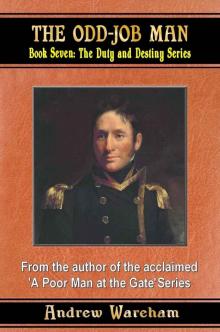 The Odd-Job Man (The Duty and Destiny Series, Book 7)
The Odd-Job Man (The Duty and Destiny Series, Book 7) Fire and Folly (Man of Conflict Series Book 3)
Fire and Folly (Man of Conflict Series Book 3) A Victorian Gent (The Making of a Man Series, Book 1)
A Victorian Gent (The Making of a Man Series, Book 1)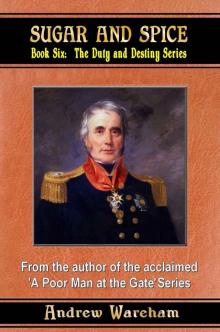 Sugar and Spice (The Duty and Destiny Series, Book 6)
Sugar and Spice (The Duty and Destiny Series, Book 6) Dark Days Of Summer (Innocents At War Series, Book 4)
Dark Days Of Summer (Innocents At War Series, Book 4) Dire Shenanigans (The Making of a Man Series, Book 2)
Dire Shenanigans (The Making of a Man Series, Book 2) The Fuzzy-Wuzzy Man (The Duty and Destiny Series, Book 3)
The Fuzzy-Wuzzy Man (The Duty and Destiny Series, Book 3) Privilege Preserved (A Poor Man at the Gate Series Book 5)
Privilege Preserved (A Poor Man at the Gate Series Book 5)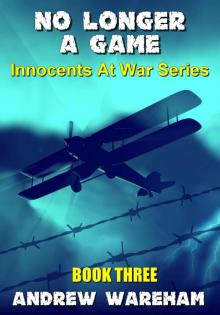 No Longer A Game (Innocents At War Series, Book 3)
No Longer A Game (Innocents At War Series, Book 3) An Uncertain Peace (The Making of a Man Series, Book 3)
An Uncertain Peace (The Making of a Man Series, Book 3) Fortune And Glory (The Duty and Destiny Series, Book 5)
Fortune And Glory (The Duty and Destiny Series, Book 5) The Old Order (A Poor Man at the Gate Series Book 7)
The Old Order (A Poor Man at the Gate Series Book 7) A Place Called Home (Cannibal Country Trilogy, Book 2)
A Place Called Home (Cannibal Country Trilogy, Book 2) Nouveau Riche (A Poor Man at the Gate Series, Book 2)
Nouveau Riche (A Poor Man at the Gate Series, Book 2) The Privateersman (A Poor Man at the Gate Series Book 1)
The Privateersman (A Poor Man at the Gate Series Book 1) Britannia’s Son (The Duty and Destiny Series, Book 4)
Britannia’s Son (The Duty and Destiny Series, Book 4) Long Way Place (Cannibal Country Trilogy, Book 1)
Long Way Place (Cannibal Country Trilogy, Book 1) Spanish Tricks (Man of Conflict Series, Book 5)
Spanish Tricks (Man of Conflict Series, Book 5) A Parade Of Virtue (A Poor Man At The Gate Series Book 9)
A Parade Of Virtue (A Poor Man At The Gate Series Book 9) A Busy Season (The Duty and Destiny Series, Book 8)
A Busy Season (The Duty and Destiny Series, Book 8) Billy Bacon and the Soldier Slaves (Colonial Warrior Series, Book 1)
Billy Bacon and the Soldier Slaves (Colonial Warrior Series, Book 1) Raging Rajahs (Man of Conflict Series, Book 2)
Raging Rajahs (Man of Conflict Series, Book 2) Victorian Dawn (A Poor Man at the Gate Series, Book 12)
Victorian Dawn (A Poor Man at the Gate Series, Book 12) Born To Privilege (A Poor Man at the Gate Series Book 3)
Born To Privilege (A Poor Man at the Gate Series Book 3)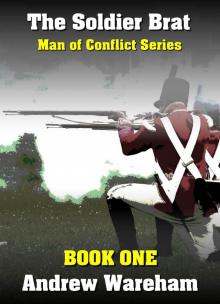 The Soldier Brat (Man of Conflict Series, Book 1)
The Soldier Brat (Man of Conflict Series, Book 1)